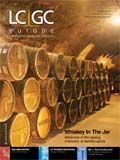Event News
Event news summary
HTC-12 and HTSP-2
The HTC symposium series has established its reputation as a leading platfrorm for the exchange of ideas on hyphenated and automated separation systems in a wide variety of applications. The Old Saint John Conference Center, in the heart of historical Bruges, Belgium, will host the 12th International Symposium on Hyphenated Techniques in Chromatography and Hyphenated Chromatographic Analyzers (HTC-12) from 1–3 February 2012.
The three-day event will cover recent developments in chromatographic and mass spectrometric techniques from leading academic and industrial experts, including fundamental aspects, new instrumentation and state-of-the-art applications.Historically the series has been a gateway between academic research and industrial implementation. The broad scientific and social contact time between the exhibitors and the industrial and academic attendees aims to maximize the crosspollination of ideas, concepts and enthusiasm between those involved in hyphenated techniques. Instrument and equipment vendors will display their latest systems in the exhibition space integrated with the catering area. Presentations of the shortlisted posters and special vendor seminars will also take place.

The programme features overview lectures, key-note lectures and oral presentations. Tutorials will introduce specific fields to relative newcomers. The HTC-12 programme is further divided into application areas including food, human health and air and water analysis. There will the sessions organized by the RSC on the Thursday 2 February. Other areas of interest involve life sciences, including pharmaceutical and bioanalytical applications; metabolomics; sustainability, environmental and industrial analysis, with special attention for process analysis and alternative fuels; green hyphenated chromatography; natural products; and hyphenated electrodriven systems. Key researchers have been invited to highlight the quality of the programme including: Aviv Amirav, Josep Bayona, Tadeusz Gorecki, Jurre Kamphorst, Robert Kennedy, Sergey Krylov, Bruno Le Bizec, Abdul Malik, Pat Sandra, Philip Marriott, Luigi Mondello, Janusz Pawliszyn, Valérie Pichon, Sarah Rutan, Gert Desmet, Robert Shellie, Robert Synovec, Oliver Trapp, Yvan Vander Heyden, Frank David and Tuulia Hyötyläinen.
To encourage scientific exchange and friendship building, the rich social programme will consist of a welcome party, reception at the historic Town Hall, beer tasting evening in a local brewery, symposium dinner and farewell cocktail.
Echoing the strong link between hyphenated and automated separation systems and sample preparation techniques, the 2nd International Symposium on Hyphenated Techniques for Sample Preparation (HTSP2) will be organized on 31 January–1 February 2012, partially coinciding with HTC-12 to allow scientists to attend both meetings. The HTSP meeting is a strong programme in its own right, with a number of experts from around the world as invited speakers. Because of the overlapping schedule, participants of HTSP will be able to catch a glimpse of some of the HTC-12 lectures and posters — and vice versa.
Several awards will be presented during the course of these events including the HTC-award, sponsored by Elsevier Science, honouring the most innovative paper or poster; and the lifetime achievement award, sponsored by LC•GC Europe, honouring a scientist for outstanding achievements in the field of hyphenated techniques in chromatography and for distinguished service to the international chromatographic community. The most innovative poster contribution will also be awarded a poster award by the scientific advisory committee.
Short courses will be organised on Monday 30 and Tuesday 31 January by Janusz Pawliszyn, University of Waterloo, Canada on 'SPME' and Hernan J. Cortes, USA on 'Multidimensional Chromatography' respectively.
Tel: +32 9264 4986; Fax: +32 9264 9606
E-mail: htc@ordibo.be
Website: www.ordibo.be/htc
10–12 October 2011
International Symposium of AOC European Section
University Erlangen-Nuremberg, Germany
Organizers: AOAC Europe Section and the German Chemical Society
Tel: +49 9163 88 337
Fax: +49 9163 88 456
Contact: Dr Klaus Reif
E-mail: klaus.reif@phytolab.de
Website: www.aoaceurope.com
17–19 October 2011
23rd International Ion Chromatography Symposium (IICS 2011)
Marriott Providence Hotel, Providence, Rhode Island, USA
Organizers: Californian Separarion Science Society (CASS)
Tel: +1 510 428 0740
Fax: +1 510 428 0741
E-mail: ahein@casss.org
Website: m360.casss.org/event.aspx?eventID=26608
31 October–1 November 2011
22nd Annual International Light Scattering Colloquium
Four Seasons Biltmore Resort, Santa Barbara, California, USA
Organizers: Wyatt Technology Corporation
Tel: +1 805 681 9009 ext 210
Fax: +1 805 681 0123
E-mail: lmcgowan@wyatt.com
Website: http://www.wyatt.com/events/ilsc/22nd-annual-international-light-scattering-colloquium.html
1–4 November 2011
RAFA 2011
Clarion Congress Hotel Prague, Prague, Czech Republic
Organizers: Institute of Chemical Technology, Czech Republic and RIKILT — Institute of Food Safety, The Netherlandss
Tel: +420 2 2044 3185
Fax: +420 2 2044 4369
E-mail: RAFA2011@vscht.cz
Website: www.rafa2011.eu/index.html
Send any event news to Doug Kitson at dkitson@advanstar.com

New TRC Facility Accelerates Innovation and Delivery
April 25th 2025We’ve expanded our capabilities with a state-of-the-art, 200,000 sq ft TRC facility in Toronto, completed in 2024 and staffed by over 100 PhD- and MSc-level scientists. This investment enables the development of more innovative compounds, a broader catalogue and custom offering, and streamlined operations for faster delivery. • Our extensive range of over 100,000 high-quality research chemicals—including APIs, metabolites, and impurities in both native and stable isotope-labelled forms—provides essential tools for uncovering molecular disease mechanisms and exploring new opportunities for therapeutic intervention.
New Guide: Characterising Impurity Standards – What Defines “Good Enough?”
April 25th 2025Impurity reference standards (IRSs) are essential for accurately identifying and quantifying impurities in pharmaceutical development and manufacturing. Yet, with limited regulatory guidance on how much characterisation is truly required for different applications, selecting the right standard can be challenging. To help, LGC has developed a new interactive multimedia guide, packed with expert insights to support your decision-making and give you greater confidence when choosing the right IRS for your specific needs.

.png&w=3840&q=75)

.png&w=3840&q=75)



.png&w=3840&q=75)



.png&w=3840&q=75)










